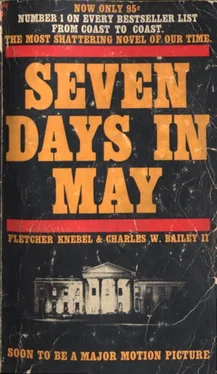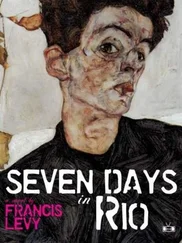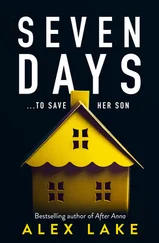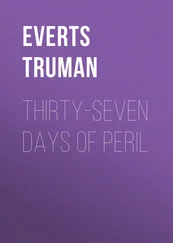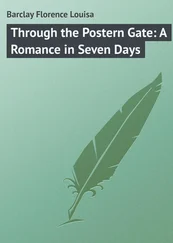This week's batch gave him a pretty clear picture of the mood of the country, and it definitely was not an optimistic one. The Atlanta Constitution's lead editorial, for example, began:
As the date for the first stage of disarmament draws near, our skepticism as to Russia's good faith mounts. We hope, of course, that President Lyman's trust in Moscow proves justified, but ...
There was a similar rumble in the New York Times judgment, delivered in customary doomsday style:
We supported the nuclear disarmament venture with grave reservations. These reservations have by no means been diminished in recent days by the pronouncements in Pravda, the official Soviet party organ ...
My God, Lyman mused, you'd think editorial writers were the only people in America who ever had grave reservations. He climbed out of bed, walked into the big oval study, and poured himself a cup of coffee from the carafe that had been left there a few minutes earlier.
Through the tall windows overlooking the south lawn Jordan Lyman could see the steady morning rush of cars along Constitution Avenue. It's a funny thing, he thought. The people in those cars work for the government, just as I do. I can tell them what to do. I can make their jobs or wipe them out. But they have the power to undo what I do, by simple error, or by omission, or even by design.
He was President and famous. They were little bureaucrats and obscure. But they were, by and large, secure and befriended in their obscurity, while he stood vulnerable and alone in his fame.
Lyman had read more than enough American history to have known, on the day he returned from his oath-taking to enter the White House, that he faced loneliness. But his pre-inaugural comprehension had been academic, born of memoirs and legends. (Harry Truman said: "The buck stops here.") No reading, no advice from those who preceded him, had prepared him for the crushing emotional load of the Presidency. Jordan Lyman would never forget the hour he had spent, shaken and depressed, after receiving his first full briefing on the mechanics by which he alone could, in some fatal moment of crisis, open the floodgates of nuclear war.
He took a gulp of hot coffee. "Cut it out, Lyman," he growled out loud. "You're feeling sorry for yourself again."
The President picked up the morning paper from the tray beside the coffee jug where the mess attendant left it for him each day. He glanced at the front page and found the headline he knew would be there: "Lyman's Popularity Drops to Lowest Point in Poll's History."
He had expected some temporary slump in his rating. The acrimony of the Senate debate on the treaty had made a lot of headlines, which in turn couldn't have failed to hurt him. But he had been unprepared for the actual figures given him last night by his press secretary. Twenty-nine per cent, he thought, we're really getting clobbered on this one. We? Don't kid yourself. It's you, y-o-u.
He returned to the bedroom, dropped his pajamas on the floor, and went into the bathroom to wash and shave. He allowed himself to dwell a moment longer on that godawful Gallup Poll, then chided himself out loud again.
"Cheer up, world leader. Don't forget the Literary Digest picked Alf Landon in '36. You must be doing all right."
Ten minutes later he was on his way to breakfast. As he crossed the big upstairs hall, he nodded to an Army warrant officer sitting in a chair outside his room.
"Good morning."
"Good morning, Mr. President."
Nothing in the entire Presidential routine depressed Lyman quite so much as his exchange of morning greetings with these soldiers. There were five of them, and every night one sat outside Lyman's bedroom while he slept. The man on duty held a slim portfolio on his lap throughout the night. Inside it was a thin black box containing the complicated codes by which the President-and only the President-could give the orders sending America into nuclear war.
The first morning glimpse of his "atomic shadow," as Lyman called the unobtrusive warrant officers, always seemed to hurl him back into the duties of the Presidency, as though he had plunged nude into icy water. But he had learned to live with the facts of nuclear terror, and except for this first shock every day he paid no more attention to it than he did to the three-inch-thick plates of bulletproof glass set inside his office windows. The glass shields were insurance against a madman with a hunting rifle 500 yards away; the warrant officers were insurance against a madman with a ballistic missile 5,000 miles away.
Now Lyman was breakfasting in the small white-paneled family dining room downstairs, and the most pressing problem on his mind was how to teach those idiots in the kitchen to loosen the segments of a grapefruit before serving it. There was a knock on the door-jamb.
"Ah'm workin' foh the Gallup Poll," said the newcomer in the richest Georgia drawl he could manage, "and ah wantuh know how yuh feel about Jordan Lyman. Someone must like the guy. Hiyuh, Mistuh President!"
Raymond Clark's grin was as wide as his face. Even the flesh along the jawbones seemed to crinkle. Lyman laughed out loud. As always, he felt better at the sight of the junior senator from Georgia, this morning, as often, his breakfast partner.
"Put me down as undecided," Lyman said. "How about you?"
"Oh, Ah think he's a smaht ol' boy," Clark replied. "He's jes' ahead of his time, that's all." Then, dropping his heavy accent, he added: "But you'll come out okay, Jordie."
The waiter appeared with eggs, bacon, toast and fresh coffee, and the two men turned their attention to eating. As they ate, Lyman wondered if Clark ever realized how much this friendship meant to him. The Georgian was almost unique among Lyman's friends in Washington, for their relationship, though politically intimate, was only incidentally so. The bond between the two men was really almost entirely a personal one.
The public knew Ray Clark as Jordan Lyman's political manager, the man who got Lyman the presidential nomination on the third ballot at Chicago by making a deal with Governor Vincent Gianelli of New York to throw his strength to Lyman when his own momentum was checked.
But neither the public at large nor anyone at all, for that matter, knew that Clark, twenty years earlier, had given Jordan Lyman an infinitely more precious gift.
It happened in Korea where the two men-both reserve officers recalled in 1951 and assigned as infantry platoon leaders-commanded adjacent outfits on Heartbreak Ridge. They had returned together to the line after a final preattack briefing one foggy morning when Lyman simply froze, teeth chattering, eyes filling with helpless tears, in the grip of that utter exhaustion of body and spirit known as combat fatigue.
Clark joshed him gently at first. "Come on, Yankee boy," he said, using the old stand-by with which he kidded his Ohio-born buddy. "Let's go."
Lyman did not move.
"For Christ's sake, Jordie, snap out of it," Clark said, deadly serious. He spoke quietly so Lyman's men couldn't hear.
Again there was no reaction.
Clark put himself between Lyman and the troops, shoved him into a dugout and slapped him, left, right, left, right, four times, swinging his open hand as hard as he could. The two men stood there, nose to nose, staring at each other, for half a minute.
Then Clark asked: "You okay, Jordie?" and Lyman replied: "Yeah, Ray. Let's go."
Clark took a mortar fragment in his elbow that day, just after Lyman guaranteed the success of their attack by personally silencing two Chinese machine guns with hand grenades. As soon as he could, Lyman located Clark in a field hospital and visited him.
"Ray," he said, "I want to thank you for yesterday morning. You saved my life, and a lot more, when you socked me."
Читать дальше
